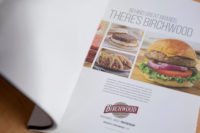Quality Wins Out
By Bryan Salvage, Editorial Director
Wimmer’s Meat Products Inc.’s key to success is maintaining Old-World quality while adapting to change by offering new products, services.
Getting ahead in the sausage industry these days is a tricky business. On one hand, you must remain contemporary in products and services --- which requires constantly changing with the times. But Old-World sausage processors have an additional challenge: successfully meeting the ever-changing demands of today’s consumer while simultaneously remaining true to Old-World recipes. Wimmer’s Meat Products Inc., West Point, NE, with its sausage-manufacturing roots anchored in Austria, is not only surviving but thriving in this highly competitive industry.
How this company has evolved over the decades is an interesting story in and of itself. In 1934, George Wimmer Sr., a native of Hainfeld, Austria, and his wife, Lisbet, moved their family from Milwaukee, WI, to Snyder, NE, to open a small butcher shop and sausage kitchen for the local community. Since then, Wimmer’s has relocated to West Point, NE, and expanded both its product lines and distribution. This growing sausage manufacturer continues evolving behind the reins of Dave Wimmer, president and grandson of the founding family.
Today, a wide range of natural-casing wieners, skinless wieners, natural-casing link sausages, braunschweiger, summer sausage, smokies, sliced lunchmeats, and deli meats are offered under the Wimmer’s®, Bassett’s®, Ambassador®, and Fairbury® brands. Collectively, products are sold throughout Nebraska, Minnesota, and Iowa, as well as in parts of Wyoming, Colorado, South Dakota, Kansas, Missouri, and Illinois. Products are primarily sold at retail followed by foodservice, private label/co-pack, and direct mail, in descending order of volume. Wimmer’s direct mail program is national in scope, and it is offered through Hastings, NE-based Nebraska’s Famous Steaks (www.famoussteaks.com). What’s more, some business is also dedicated to export through several foreign trade experts.
Best-selling products are, in descending order of sales, hot dogs and entrée sausages, like Polish and bratwursts; Little Smokies; semi-dry summer sausage in shelf-stable and refrigerated varieties; braunschweiger; and deli meats.
The Bassett, Ambassador, and Fairbury brands of product are offered thanks to strategic acquisitions made over the years, Dave Wimmer explains.
“Although these brands taste different from our Wimmer’s line of products, all three brands share one important similarity with our founding brand: quality,” he says. “All are regional brands that didn’t overlap with our existing marketing area. Each brand is unique in terms of spice and flavor profiles.
“We mix our own spices at our West Point, NE, facility, for original recipes that my grandfather brought with him from Austria,” he adds. “We’re very tuned into flavor differences. Consumers are also very sensitive to flavors in their preferred brands, and we work very hard to remain faithful to those original recipes.”
Quality ingredients
Founder George Wimmer Sr. believed that quality products begin with quality ingredients. His philosophy is still being strictly adhered to today. Products are made with:
The highest quality cuts of beef and pork with no fillers---ever.
Pure, natural spices. No extracts and distilled oils. Natural spices are like time-release capsules. The full-bodied flavor remains constant for the life of the sausage.
Hardwood smoking; natural smoking can never be duplicated, Wimmer says.
Natural casings for its wieners and sausages. Wimmer further explains that natural casings breathe as no artificial casings can. Thus, natural casings allow smoke to gently penetrate the meat better than artificial casings do. And natural casings hold in the flavorful juices and natural spices while the casings cooks, he adds. Third, there is the snappy bite, bursting with flavor that only natural casings can provide, he points out.
In marketing and merchandising products, Wimmer explains the strategy: “Generally, we try to present our products as distinctive and top quality, and we back that up with great service at all levels. For example, we maintain a sales force that provides coverage not only with chain and headquarters buyers, but they also provide personal sales contact with retailers and foodservice end-users throughout our sales territory.
“These sales folks provide store-level personal sales and merchandising and promotional support programs that enhance a retailer’s profit,” he adds. “We back that up with marketing support through mass media, as well as event-specific appearances.”
Wimmer’s has an inflatable mascot for its Wimmer brand named Top Dog. Its Fairbury brand is supported by event-specific appearances of the Wiener Slinger—a wiener gun that shoots hot dogs into the stands at University of Nebraska football games, store openings, and a variety of other events.
“We do these promotional things on a very local level,” Wimmer says,
Modern, efficient plant
All products are processed at the company’s West Point, NE, plant.
“Back in 1999, we decided to expand and upgrade this plant,” Wimmer says. “It was a good plant, but it had some capacity issues at that time. West Point is a great location. We’re close to raw materials and central to our customers. West Point, a town of four-thousand people, is a great, supportive community with a good work force. We decided with today’s environment that we’d be better off improving one plant rather than running four smaller ones.”
Phase One of the reconstruction project began in June 2001 with expanding the packaging room, plus upgrading refrigeration, boilers, electrical service, and wastewater processes. Construction continued throughout 2002 and 2003.
“We added new raw material, receiving, and waste disposal areas,” Wimmer says. “And we increased the size of our sausage batching and processing areas. We also built our own micro and chemical laboratory. We felt we could do a better job with quality assurance by having an in-house lab manned by qualified individuals. It has been a great asset for us. This plant has received some of the highest food-safety marks possible from Food Safety and Inspection Service reviews, as well as third-party auditors.”
Construction was completed in January 2004.
“We finished this process with a complete renovation of our smoke room, which included replacing all of our smoke houses,” Wimmer says. “Once completed, we ended up with a seventy-thousand square-foot facility. This leaves us with a very modern, efficient plant with capacity to grow and the capability to comply with regulatory requirements.”
When asked about product volume, Wimmer answers: “We have product in retail and foodservice distribution that serves fourteen-million consumers in nine upper-Midwestern states.”
Wimmer’s has forged private-label relationships with branded product grocery wholesalers.
“We also have some private-label, niche-market customers for whom we manufacture game and exotic meats in different processed products like buffalo and venison,” Wimmer says. “And we have developed the capability to make all-natural products for a marketer who serves the natural and organic market under his own brand.”
Surviving and thriving
Operating successfully for more than 70 years in the meat industry is quite an accomplishment. How did Wimmer’s manage to not only survive but thrive?
“There’s no real easy answer because it’s not an easy business to be in right now,” Wimmer chuckles. “Growth is necessary but difficult in today’s environment. We have grown steadily in the last ten years. It takes focus and effort. We don’t place all of our efforts and resources into one avenue of growth. We try to grow existing brands and markets plus remain open to new and creative growth strategies in all phases of our business. If you say, ‘Gee…we don’t do that because we’ve never done it,’ you may be passing up a good opportunity.”
Working in markets that oftentimes are driven by events not predictable and over which there is little control is among Wimmer’s major challenges.
“BSE [bovine spongiform encephalopathy] is a classic example of this point,” Dave Wimmer says. “The regulatory climate and consumer attitudes concerning food safety require an ongoing focus and best practices each and every day. And both our big customers and competitors continue getting bigger through consolidation.”
Despite these challenges, there are opportunities for growth.
“Opportunities exist for those of us who are willing to offer products and services that some of the very large competitors are not able or willing to do themselves,” Wimmer says. “Today, you must be willing and open to change and to explore new things and new business relationships.”
Wimmer’s vision for the future is to have his company continue to offer a balance of value to customers and consumers, maintain a challenging and respectful environment for his employees, and to consistently gain a good return for company owners.
“These are the three corners of the business triangle we try to take care of all of the time,” Wimmer adds. “If we do a good job, we’ll continue to succeed.”
Will more acquisitions be made down the road? Wimmer responds: “We keep the door open.” NP
Behind the brands
Ambassador – Natural-casing wieners, summer sausage chubs, and smokies bite-sized smoked sausage are sold throughout Minnesota, and in eastern North and South Dakota.
Bassett’s – Natural-casing dinner sausage, bratwurst, and lean cottage bacon are sold in Minnesota and South Dakota.
Fairbury – Hot dogs and processed meats are sold in southern Nebraska and northern Kansas.
Wimmer’s – Wide range of sausage, hot dogs, and processed meats are sold state-wide in some states, and in parts of other states, within a nine-state marketing area: Nebraska, Iowa, Minnesota, Missouri, Illinois, South Dakota, Kansas, Colorado, and Wyoming.



Report Abusive Comment